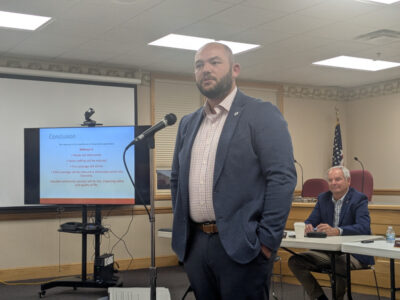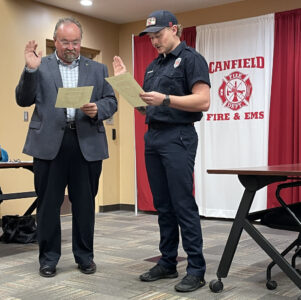Trumbull officials discuss property tax reform

HOWLAND — One representative said he wasn’t using scare tactics when he said life in the state would be altered if property taxes were to be abolished.
Trustees and fiscal officers from townships throughout Trumbull County made up a majority of the crowd that also included residents at the township administration building Monday evening, as Howland officials and county commissioners discussed the potential impact of a statewide effort to eliminate the state’s property taxes.
The effort is being spearheaded by the Committee to Abolish Ohio Property Taxes. The organization aims to place the initiative on the ballot for the November 2026 election after missing the 2025 ballot deadline.
They also hoped to discuss the preexisting limitations on entities and local governments to adopt a new real property taxation system, building on the trustees’ understanding of the impact and shock property valuations have had on property taxes — as well as the interest in providing relief to people living in the state.
While no state representatives could make it to the meeting, Howland trustee James LaPolla said trustees planned on sending details to them afterward, so the meeting would still have purpose.
HOWLAND TOWNSHIP
Thomas Krispinsky, Howland’s fiscal officer, told attendees that township revenue is “heavily dependent” on taxes, noting that they make up 85% of its revenue, while state funding makes up 2% and other sources fill things out at 13%.
Using their 2024 fiscal year’s figures as an example, Krispinsky laid out the township’s general, police, road and fire funds and the potential impact each one would experience with the loss of property taxes.
Kim Mascarella, Howland’s planning director, said that while the township receives grants to fund and implement projects, local revenue is integral to provide matching funds, using the idea of receiving a $100,000 grant that would require them to chip in $20,000 as an example.
“It’s important for us to have some local revenue to leverage those funds to implement all those projects in one year — sidewalks,” Mascarella said. “We got a grant for the farmers market to help promote that, the Golden Triangle, our local match was over $100,000 to improve the roads for all the businesses down in the Golden Triangle.”
Local revenue is “part and parcel” of what the planning department is doing to make the community more functional, she added.
Krispinsky examined the township’s road fund, which is 99% funded by taxes, and noted a renewal levy on the upcoming ballot for it. Only 1% of the road fund budget is made up by “other”, something Krispinsky said was selling old equipment.
“That’s for fixed assets, that’s when we would sell old equipment. I’m sure with us not having any tax money come in, we’re not going to have anything to sell,” Krispinsky said.
The township’s police department is slightly less dependent on property taxes, with them making up 89% of the police fund. Howland police Chief Nick Roberts listed some of the items that would be impacted without them — from officer salaries to training.
“We have our contracts and our technology — essential systems required for safe and efficient policing. Our scheduling system, our reports and evidence management system, our body-worn camera program, our radio fees, our Trumbull County 911 contract,” Roberts said. “LEADS licensing fees — these are all critical for efficiency, accountability and compliance, and secure communications.”
Howland fire Chief Raymond Pace said their fire department is the busiest in Trumbull County, responding to 4,120 emergencies in 2024. The 25 property tax-funded departments in the county responded to 30,392 emergencies last year — an average of 83 calls a day.
“The question we must ask ourselves is, who will respond to these emergencies if we eliminate property taxes without a comprehensive funding plan?” Pace said. “There’s an insurance impact, as well. The Insurance Service Office (ISO) assigns public protection ratings for fire departments on a scale of 1 to 10 — one being the highest rating and 10 being the lowest.”
Pace said the ratings directly impact homeowner and business insurance premiums, noting that the township maintains a three rating. He said without stable funding, that rating will deteriorate, resulting in higher premiums for everyone in the township.
Pace said he encouraged thoughtful planning that would ensure continued protection for communities, while addressing tax reform concerns. Pace said some might suggest regionalization, the consolidation of multiple local departments into a single, multi-jurisdictional entity, as a solution, but he warned of several critical factors, such as response times, local expertise and insurance.
“Larger geographical coverage areas typically result in longer response times to emergencies,” Pace said. “Each community has unique hazards and specialized needs that require tailored training and preparation, and the one-size-fits-all approach often falls short.”
Pace said regionalization also impacts ISO ratings — frequently leading to them ending up higher — and translates to increased homeowner and business insurance premiums.
COUNTY OFFICIALS
Trumbull County Auditor Martha Yoder said that while there is “no denying” property taxes are a significant part of the county’s budget, townships would be hit more by property taxes being repealed because of their limited ability to replace the lost revenue.
“They have fewer options than schools, fewer options than the county. The county has an option of sales tax — they always have that ability,” Yoder said. “All the townships have is property tax, they (Howland officials) went through it. Howland has a few more options than some of the others because of its size, but the impact on the townships would be catastrophic.”
Trumbull County Commissioner Denny Malloy recalled sitting in presentations with state Rep. David Thomas, R-Jefferson, who represents most of Trumbull County, adding that the state has also said, “if we don’t do something, the voters are going to do it.”
“We saw it with marijuana. When marijuana went on the ballot; there’s people against it, there’s different townships, but when the public spoke, marijuana’s legal,” Malloy said. “If you give them an opportunity to say, ‘Do you want to pay no sales tax, or do you want to pay sales tax?’ They’re going to say no sales tax, they’re not thinking ahead like we are.”
Malloy said they may be “cooked” if property taxes go on the ballot, no matter what Thomas, the state legislature or anyone does.
Malloy also said he’s heard regionalization come up among politicians in Columbus, which scares him, because cities can’t have an income tax or tax their residents. He used the example of joint economic development districts in townships and their ability to collect money.
“I fear, what happens if it comes to the point where we lose out property tax, the cities can collect income tax, just like the county can,” Malloy said. “We would have to raise sales tax, and what if the cities got into a situation like that where they’re raising their income tax on the people that reside or work in their cities, are they going to start gobbling up the townships? will Niles gobble up Weathersfield?”
Commissioner Rick Hernandez echoed Malloy’s belief that the public would vote against the property taxes, adding that he was dissatisfied with state representatives for encouraging that type of tax proposition.
“We’re going to need to be diligent — work with our townships, work at a state level, you gotta really reach out to the governor,” Hernandez said. “Reach out to the state representatives, to our senators, and voice our opinions as to what our feelings are about moving forward.”
Commissioner Tony Bernard said that everyone in the room was facing the property tax issue together, adding that he personally believed that a reduction of the current rate is needed.
“Let’s roll some of that, those increases back, okay? To where it’s not so hard on the taxpayers, but we do need some form of property tax to let the townships and the county survive,” Bernard said. “I would favor, let’s roll back the last couple of increases that we had.”
Kyle Brooks, the director of governmental affairs for the Ohio Township Association, an organization representing all 1,308 townships in the state, said the OTA recognized property taxes as an issue.
They are seeking reform, not repeal of the system, however.
“As an entity that is property tax only, we understand it needs to be reformed, people’s bills are outrageous — we agree with you. But the repeal, not reform, would alter the state of Ohio,” Brooks said. “The quality of life in Ohio, we believe, would be drastically diminished.”
Brooks said people rely on safety services when they call 911, want their kids to go to school and want to be able to enjoy a park — all of which are paid with property taxes.
Brooks said there is $24 billion per year in property taxes collected. Out of that, townships get $1.5 billion of it.
“One of my duties is to travel to townships and speak; there’s counties out there that would have no fire, no police and no school district,” Brooks said. “And I’m not exaggerating when I say that their kids would have to ride a bus to a neighboring county to go to school because they would have no property tax, there’s not a lot of business, etc.”
“I’m not using scare tactics when I do say that life would be altered for the worse, and I know that’s hard to hear when you’re paying your property tax bill. But that’s why it’s important to contact your representatives and ask for reform for property tax.”


